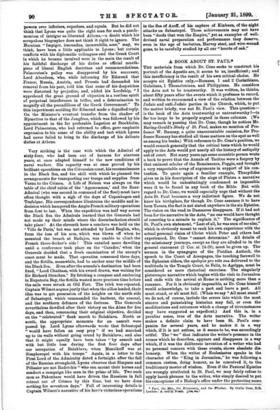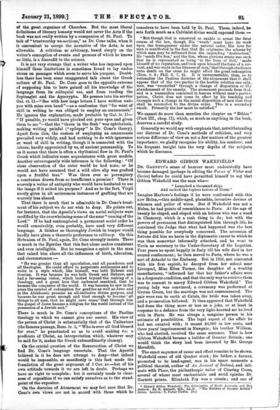A BOOK ABOUT ST. PAUL.*
THE materials from which Dr. Cone seeks to construct his portrait of the Apostle are, it seems to us, insufficient ; and this insufficiency is the result of his own critical choice. He accepts six Epistles only,—Romans, 1 and 2 Corinthians, Galatians, 1 Thessalonians, and Philippians. He considers the Acts not to be trustworthy. It was written, he thinks, about fifty years after the events which it professes to record, and written to recommend a view of the relation between the Judaic and anti-Judaic parties in the Church, which, to put the matter briefly, was not St. Paul's view. This question— is the book of the Acts trustworthy or untrustworthy ?—is far too large to be properly argued in these columns. (We may remark in passing that Dr. Cone, though he notices Mr. Baring-Gould's Study of St. Paul, makes no mention of Pro- fessor W. Ramsay, a quite unaccountable omission, for Pro- fessor Ramsay has studied all these matters on the spot as well as among his books.) With reference to Dr. Cone's position, we would remark generally that the critical tests which he would apply to the Acts would put nearly all the history of antiquity out of court. Not many years ago some eccentric person wrote a book to prove that the Annals of Tacitus were a forgery by that eminent scholar of the Renaissance, Poggio, and brought a very respectable array of arguments in support of his con- tention. To quote again a familiar example, Thucydides gives us in his description of the siege of Plat ea a narrative which would be unhesitatingly condemned as impossible were it to be found in any book of the Bible. But with regard to Dr. Cone, we would especially urge that without the Acts St. Paul becomes a very indistinct figure. We do not know his birthplace, for though Dr. Cone assumes it to have been Tarsus, the fact is not stated anywhere in the six Epistles. The vision on the road to Damascus disappears. If it had not been for the narrative in the Acts, " no one would have thought of resorting to a miracle to explain it." The significance of St. Paul's own statement, " Last of all, he was seen of me also," which is obviously meant to rank his own experience with the actual personal vision of Christ which Peter and others had experienced, Dr. Cone "cannot determine." All details of the missionary journeys, except as they are alluded to in the general statement (2 Cor. xi. 24-29), must be given up. The sermon in the synagogue of the Pisidian Antioch, the speech to the Court of Areopagus, the touching farewell to the Ephesian elders, the apologia pro vita sua delivered to the multitude in the Temple Court, to Felix, to Agrippa, must be considered as mere rhetorical exercises. The singularly picturesque narrative which begins with the visit to Jerusalem and ends with the arrival at Rome is nothing more than a romance. For it is obviously impossible, as Dr. Cone himself would acknowledge, to take a part and leave a part. All must stand, or all must fall. (When we say "All must stand" we do not, of course, include the errors into which the most sincere and painstaking historian may fall, or even the modifications and reticences which a change of circumstances may have suggested as expedient.) And this is, in a peculiar sense, true of the Acts narrative. The writer makes a definite claim to have been St. Paul's com- panion for several years, and he makes it in a way which, if it is not artless, as it seems to be, was exceedingly artful. The "we " that indicates the writer's presence in the scenes which he describes, appears and disappears in a way which, if it was the deliberate invention of a writer who had no personal concern with these events, shows absolute dis- honesty. When the writer of Ecclesiastes speaks in the character of the "King in Jerusalem," he was following a common custom, doing honour, as he conceived it, to the traditionary master of wisdom. Even if the Pastoral Epistles are wrongly attributed to St. Paul, we may fairly refuse to apply harsh phrases to the writer, who simply desired to put his conceptions of a Bishop's office under the protecting name • Paul. the Man, the Mie.ionary, and the III.Scher. By Orel° Cone, D.D. London : A. and V. B AWL:, Llut W.)
of the great organiser of Churches. But the moat liberal definitions of literary honesty would not cover the Acta if the book was not really written by a companion of St. Paul. To talk of "trustworthy we-sections," as Dr. Cone talks, when it is convenient to accept the narrative of the Acts, is not allowable. A criticism so arbitrary, based simply on the writer's conception of events and persons of which he knows so little, is a discredit to the science.
It is not very strange that a writer who has imposed upon himself these limitations is sometimes found to lay undue stress on passages which seem to serve his purpose. Doubt- less there has been some exaggerated talk about the Greek culture of St. Paul. Dr. Cone goes to the opposite extreme of supposing him to have gained all his knowledge of the language from its colloquial use, and from reading the Septuagint and the Apocrypha. He presses into his service Gal. vi. 11—" See with how large letters I have written unto you with mine own hand "—as a confession that "for want of skill in writing he was obliged to employ an amanuensis." He ignores the explanation, made probable by Gal. iv. 15- " If possible, ye would have plucked out your eyes and given
them to me "—that the "thorn in the flesh" was ophthalmia, making writing painful ("epilepsy" is Dr. Cone's theory). Apart from this, the custom of employing an amanuensis
prevailed very widely, and had nothing to do with ignorance or want of skill in writing, though it is connected with the labour, hardly appreciated by us, of ancient penmanship. To us it seems that there is often a rhythmical flow in St. Paul's Greek which indicates some acquaintance with great models.
Another extravagantly wide inference is the following : " Of close observation of the outer world he had none, or he would not have assumed that a wild olive slip was grafted upon a fruitful tree." Was there ever so peremptory a conclusion drawn from so insufficient a premise ? There is scarcely a writer of antiquity who would have hesitated to use the image if it suited his purpose ? And as to the fact, Virgil surely gives in all seriousness instances of grafting that are scarcely less absurd.
That there is much that is admirable in Dr. Cone's treat- ment of his subject we do not wish to deny. He points out, for instance, that the Apostle's views on social subjects were modified by the overwhelming sense of the near " coming of the Lord." If he had contemplated a permanent social order he would conceivably, even probably, have used very different language. A thinker so thoroughly Jewish in temper would hardly have given a theoretic preference to celibacy. On this Hebraism of St. Paul, again, Dr. Cone strongly insists. There is much in the Epistles that this fact alone makes consistent and even intelligible. But he recognises a spirit in the man that raised him above all the influences of birth, education, and circumstances :-
" He was greater than all speculation, and all paradoxes, and all theologies. He could afford to perpetrate antinomies and to write in a style which, like himself, was both Hebraic and Grecian. It was because be was both Greek and Hebrew, and had a far-seeing vision, which looked beyond the making of a theology, and a great love that embraced mankind, that he became the conqueror of the world. It was because he saw in the cross the symbol of redemption for gentiles as well as Jews and in the Abrahamic promise an all-inclusive divine purpose, and because he was great enough and kind enough to become all things to all men, that he might save some,' that through him the gospel of Jesus became a religion for the world instead of the possession of a Jewish sect."
There is much in Dr. Cone's conceptions of the Pauline theology to which we cannot give our assent. His view of
the person of Christ is substantially that of the Unitarians (the famous passage, Rom. ix. 5, " Who is over all God blessed for ever," he punctuated so as to avoid making Bee; a
predicate of Christ, an interpretation which, whatever may be said for it, makes the Greek extraordinarily clumsy).
On the crucial question of the Resurrection of Christ we find Dr. Cone's language uncertain. That the Apostle believed in it he does not attempt to deny—that indeed would be impossible, so manifestly is this fact made the foundation of the great argument of 1 Cor. xv.—but of his own attitude towards it we are left in doubt. Perhaps we have no right to complain ; but it certainly tends to clear- ness of exposition if we can satisfy ourselves as to the stand- point of the expositor.
On the doctrine of Atonement we may feel sure that Dr. Cone's own views are not in accord with those which he
conceives to have been held by St. Paul. These, indeed, he sets forth much as a Calvinist divine would expound them:— "But though God is conceived as unable to arrest the fatal course of the law, though His a wrath' must have its work upon the transgressor under the natural order, His love for man is manifested in the fact that He originates the scheme by which man may be delivered from the impending a destruction.' He sends His Son,' and the Son, whose glorious estate was such that he is represented as being in the form of God," made himself of no reputation, and took upon himself the form of a ser- vant, and was made in the likeness of men,' that through obedience unto death on the cross he might effect the great redemption (Rom. v. 8; Phil. ii. 7, 8). It is unwarrantable, then, so to rationalise the Pauline doctrine of the atonement that it shall appear that of the two parties in the hostile relation one only, man, was reconciled' through a change of disposition or the abandonment of his enmity. The atonement proceeds from God, and is a transaction conceived in heaven without man's partici- pation. Christ does not come to effect by his teaching and example such a change in the moral disposition of men that they shall be reconciled to the divine order. This is a secondary result. Primarily the law must be satisfied."
We cannot do more than mention the chapter on " Ethics " (Part III., chap. 11), which, as much as anything in the book, deserves a careful study.
Generally we would say with emphasis that, notwithstanding our distrust of Dr. Cone's methods of criticism, and very serious difference of view on not a few matters of the greatest importance, we gladly recognise his ability, his candour, and his frequent insight into the very depths of the subjects which he discusses.



































 Previous page
Previous page